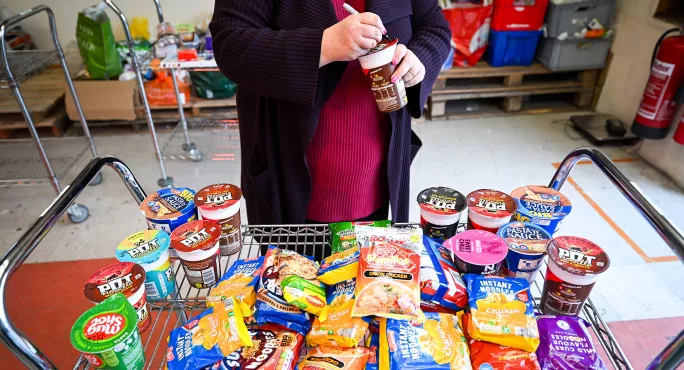Schools have increasingly stepped in as a fourth emergency service and are now the biggest source of charitable food and household aid for families struggling with the cost-of-living crisis, a new report suggests.
There are more than 4,000 school-based food banks in primary and secondary schools across England, which equates to one in every five schools running one, research shows.
Researchers from the University of Bristol found that school food banks are more prevalent in deprived areas, highlighting the severity of child food insecurity and the challenges that low-income families are facing.
The report calls for greater awareness of the problem among policymakers and for reforms, including an overhaul of the social security system, to address the growing issue.
More food banks ‘inside schools than outside’
The lead author of the research, Dr William Baker, said: “Our research shows there are now, quite shockingly, more food banks inside schools than outside of schools in England.
“In recent years inflation has sent the cost of essentials spiralling, while other forms of state support have withered due to swingeing cutbacks.
“Schools are on the frontline in responding to food poverty and many are offering crisis services to struggling families.
“Teachers and support staff see the devastating effects of poverty and the cost-of-living crisis daily, so they have felt compelled to act.
“The result is a flourishing patchwork of food banks, pantries and food clubs, which have become well-established, are often highly organised operations distributing more than just food and are an indictment of this country’s retreating welfare state.
“I’ll never forget the stark image of dozens of boxes of new school shoes, bought out of school funds, stacked up ready for distribution as if this was business as usual.”
The survey data used in the study indicates that food banks exist in more than one-fifth (21 per cent) of schools, and this rises to one-third (33 per cent) in schools with high numbers of students from deprived backgrounds.
Food banks in schools ‘now normal’
Charitable and third sector organisations, chiefly The Trussell Trust and the Independent Food Aid Network, remain key players in providing food to struggling families, with these two organisations operating 1,646 and 1,172 food banks respectively.
But the latest data indicates that schools now outstrip them, running an estimated 4,250 food banks.
“The fact so many schools now offer a food bank raises the possibility that they may have already become completely normalised and institutionalised within schools in England,” Dr Baker said.
The report builds on Dr Baker’s previous research, which uncovered how school food aid operations varied in size and structure, ranging from discreet food parcels given to parents and funded by staff donations to larger-scale, well-advertised regular provision with food supplied by large supermarkets and food waste charities.
The report claims policymakers are largely unaware of the nature and scale of the problem. During the Covid pandemic there were high-profile media campaigns for universal free school meals and holiday food vouchers.
‘No national support’
Dr Baker said: “There is a policy vacuum around charitable food aid in schools in England and across the UK.
“Although much attention has been given to free school meal provision, the pressing wider problem of children going hungry routinely at home due to rocketing food costs and other budget pressures, such as fuel prices and interest rates, isn’t being properly addressed.
“The fact schools are running food banks en masse is falling under the radar with no national support, guidance or oversight.
“Food charity is not the solution: people need secure, fairly-remunerated jobs, and support through the benefits system, so they can afford to properly feed and clothe their kids.”
For the latest education news and analysis delivered directly to your inbox every weekday morning, sign up to the Tes Daily newsletter





